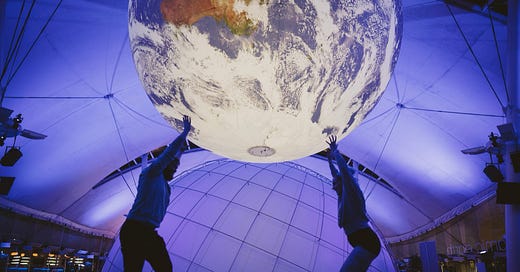A positive future for people and planet – Interdisciplinary Learning and Responding to Global Challenges.
by Conor Ellis, Science Learning and Engagement Director at Dynamic Earth
My preferred framing of the climate crisis comes from Mary Annaïse Hegler – “The thing about climate change is that you can either be overwhelmed by the complexity of the problem or fall in love with the creativity of the solutions.” It can be heartening to remember this in a world where we can seemingly be bombarded with negativity at every angle, particularly when empowering everyone with understanding and empathy for the Earth is what I, and the team at Dynamic Earth – the Edinburgh Science Centre and Planetarium, do every day.
Our vision is of a positive future for us and our planet. Through a portfolio of compelling science engagement at our centre and nationally across Scotland, we are driven by a positive belief that people of all ages and backgrounds can be the problem-solvers of the future.
The words of Annaïse Hegler resonate so deeply with me because I believe we need a solutions-oriented culture when we’re facing global challenges — locally, nationally and internationally — that are complex and multifaceted, from the climate emergency to energy transitions, building sustainable cities and international food security — to name a few. Solving these challenges needs a joined-up strategic approach and demands that we collaborate and work together across boundaries and disciplines to create a positive future for people and planet.
One of the biggest considerations for me in my role at Dynamic Earth is how we best harness the full power and potential of interdisciplinary and project-based learning at our charity. The Science Centres & Museums of the Future Missions + Opportunities report highlighted that science centres have a key strategic role to play in creating future-ready citizens, offering lifelong learning opportunities and moments to use practice and question science and its connection to the world around them.
If Dynamic Earth is enabling a culture of problem solvers and solutions-oriented people, we’re ultimately helping shape a society of interdisciplinary thinkers. Our centre has a unique exhibition and broad portfolio of learning and engagement programmes for school learners, community groups and families, where we tell Earth’s story in immersive and interactive ways, dealing with a broad spectrum of issues, ideas and topics. It’s therefore unsurprising that we embrace an interdisciplinary approach in our storytelling at our science centre that connects topical and timely research with wider cultural lenses to show the relevance and importance of science in our everyday lives and futures. Examples include our Climate Justice workshop for secondary school learners which considers the socio-economic and health inequalities of climate change in a simulated interactive COP workshop, or in our tropical rainforest programmes which consider how rainforests worldwide have cultural, social, economic and political as well as scientific importance in the context of a global system.
Interdisciplinary learning is not a new concept, but what is clear from our teacher focus groups and networks is that it’s not necessarily being consistently understood and applied across all learning settings or stages across Scotland. What’s equally clear is that making time and space to learn differently across the curriculum – whilst easier said than done – has the potential to transform how learners learn across the country. It’s something they’re asking for – as evidenced in recent findings from Education Scotland’s EKOSGEN “structural barriers to participation in STEM” survey – and something they’re entitled to through IDL being one of the four contexts for learning in the Curriculum for Excellence. In the context of upcoming curriculum reform in Scotland there’s an enormous opportunity to embrace learning differently in both principle and practice, but practitioners across the country need support across the system to get there.
Science centres have enormous potential to support a national network of interdisciplinary learning opportunities across the country. Our programmes for learners ages 3-18 can be delivered consistently across all learning levels and stages as we’re not held to the same timetable barriers as school settings, and our Career Long Professional Learning (CLPL) opportunities give practitioners opportunities to evolve their knowledge, confidence and skills in creating and delivering interdisciplinary science in their own setting. We’re also charities that sit at the interface of research and non-specialist audiences, connecting visitors of all ages and backgrounds with real people working in cutting edge science in response to global challenges. At Dynamic Earth, we advocate that “you can’t be what you can’t see”. We are always looking for new ways to show how specialists across diverse disciplines and subject areas are working collaboratively to solve problems and help inspire the next generation of creative thinkers equipped to create a sustainable future.
With educational reform high on the agenda, it feels like we’re at an exciting point in Scottish education where there’s new potential to place interdisciplinary learning front and centre for learners across the country. I’m proud of the part Dynamic Earth and other science centres play in shaping and influencing the educational landscape to develop future-ready citizens who are equipped to write the next chapter of our planet’s story. Let’s keep the conversation going and drive forward evolutions together to ensure that IDL perspectives help us solve our global challenges.
You can find out more about Dynamic Earth’s interdisciplinary workshop programmes for school learners here.
Conor Ellis is Science Learning and Engagement Director at Dynamic Earth.



